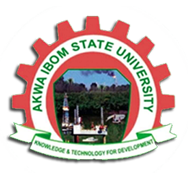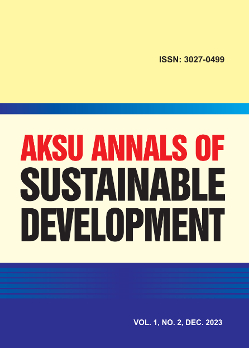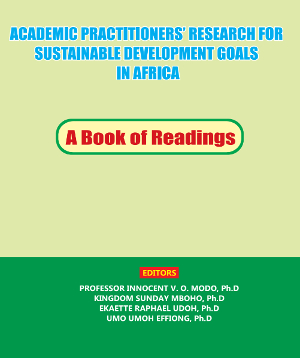THE NIGERIAN CORRECTIONAL INSTITUTION AND UTILISATION OF EDUCATIONAL PROGRAMMES FOR REFORMATION OF INMATES IN AKWA IBOM STATE
https://doi.org/10.60787/AASD-1-1-5
Keywords:
Inmate, Reformation, Educational Programmes, Utilisation, Nigerian Correctional InstitutionAbstract
The study ascertains the academic programmes and vocational training programmes in the custodial centres for reformation of the inmates of Nigerian Correctional Service. The study was guided by the assumptions of the Human Capital Theory developed by Gary Becker in 1964. The study adopted an exploratory survey research design. The Nigerian Correctional Service, Akwa Ibom State Command comprises the Medium Security Custodial Centre, Uyo, the Medium Security Custodial Centre, Ikot Ekpene, the Medium Security Custodial Centre, Eket and the Medium Security Custodial Centre, Ikot Abasi. The population comprises convicted inmates and personnel of the Nigerian Correctional Service in Akwa Ibom State Command. A total of 49 respondents were selected using a multi-stage sampling technique. The instruments for collection of data were the Focus Group Discussion and Key Informant Interviews. The qualitative data were analysed using thematic analysis method while the socio-demographic data were presented using frequency tables and simple percentages. The findings showed that academic and vocational training programmes were needed by inmates across the custodial centres but they were constrained by lack of facilities, equipment and lack of resource persons. The study recommended among others that the management of correctional centres should give adequate attention to implementing academic and vocational training programmes for inmates so that the rate of recidivism could be reduced.
Downloads
References
Adebumtimi, A. (2020). How improved prison education can decongest correctional centres, reduce crime, by experts. https://guardian.ng/features/how-improved-prison-education-candecongest-correctional-centres-reduce-crime-by-experts/ (Retrieved on 28th August, 2022).
Afujue, C. R. (2004). Case for prison reform. Reformer, 1(5): 34-46.
Ajah, B. O. and Nweke, J. O. (2017). Challenges facing vocational training of prison inmates in Nigeria: a study of Abakaliki and Awka Prisons. Middle-East Journal of Scientific Research, 25(7), 1458-1468. DOI: 10.5829/idosi.mejsr.2017.1458.1468
Ayuk, A. (2004). Congestion of Nigeria prisons and its impacts on rehabilitating, the inmates: A case study of Ikom. An Unpublished BSc Project, University of Calabar, Calabar.
Becker, S. G. (1964). Human capital: a theoretical and empirical analysis. Journal of Political Economy, 70(5), 9-42.
Bhandari, P. (2023). Population vs. sample, definitions, differences and examples.https://www.scribbr.com/methodology/population-vs-sample/ (Retrieved on 7th August, 2022)
Curtis, P. (2005). MPS. Condemn prison education.www.guardian.co.uk/print/0.05100078-108100 (Retrieved 5th June, 2023).
Davis, L. M., Bozick, R., Steele, J. L., Saunders, J. and Miles, J. N. V. (2013). Evaluating the effectiveness of correctional education: a meta-analysis of programs that provide education to incarcerated adults.
https://bja.ojp.gov/sites/g/files/xyckuh186/files/Publications/RAND_CorrectionalEducation-Meta-Analysis.pdf (Retrieved on 27th August, 2022).
Duwe, G. and Clark, V. (2014). The effects of prison-based educational programming on recidivism and employment. The Prison Journal, 94(4), 454–478. https://doi.org/10.1177/0032885514548009
Effiong, U. and Ekpenyong, O., (2017). Effect of Community Based Rehabilitation Services and Livelihood Enhancement among People with Disabilities in Akwa Ibom State, Nigeria. International Journal of Economic Development Research and Investment, 8(1), 15 – 30.
Effiong, U. and Ekpenyong, O. (2017). Community Based Rehabilitation Services and Livelihood Enhancement for Persons with Disabilities in Nigeria: A Case Study of Akwa Ibom State. Journal of Sociology, Psychology and Anthropology in Practice, 8 (1), 62-77.
Effiong U.,Udousung I. and Udoh E.(2018). Herdsmen/Farmers Crisis and Rehabilitation of Victims: A Study of Middlebelt-Nigeria. Uyo Journal of Sustainable Development, 3(2), 163-169.
Ewelum, J. N., Omeriyang, M. C. and Ugochukwu, M. K. (2015). Reformation of prison inmates through adult education programmes in Anambra State of Nigeria: challenges and Strategies for Improvement.International Journal of Education and Research, 3(3), 205-212.
George, T. (2023). Exploratory research: definition, guide and examples. https://www.scribbr.com/methodology/exploratory-research (Retrieved on 5th June, 2023).
Inusa, D. (2021). Perceived impact of vocational skills acquisition on reformation and reduction of recidivism by ex-convicts of Gombe Central Correctional Centre. Kashere Journal of Education, 2(2), 120-126.DOI: https://dx.doi.org/10.4314/kje.v2i2.15
Legislative Analyst‟s Office (2017). Improving in-prison reformation programmes. https://lao.ca.gov/Publications/Report/3720 (Retrieved on 27th August, 2022).Mboho, K. S. and Atairet, A. C. (2018). Skill acquisitions of prison inmates and economic development in Nigeria: A study of Akwa Ibom State Prison, Uyo. Journal of Sustainable Development, 3(1), 58-68.
Mboho, K. S. and Udoh, E. R. (2018). Poverty alleviation programme in Nigeria: a study of United Nations Development Programmes (UNDP) Micro-Credit Scheme in Uyo LGA of Akwa Ibom State. AKSU Journal of Management Sciences, 3(1), 68-73.
Ngwu, M. and Uche, R. D. (2021). Vocational skills training and rehabilitation of ex-convict in Calabar South Local Government Area of Cross River State, Nigeria. Prestige Journal of Counselling Psychology, 4(2), 164-173.
Ogbaka, L. C., Ewelum, J. and Anthony, A. (2017). Utilization of educational programmes in reformation of prison inmates in Nigeria. Asian Journal of Education and Training, 3(2), 86-91. DOI: 10.20448/journal.522.2017.32.86.91
Ogundipe, O. A. (2008). Education behind bars: The Nigerian experience. Reformer, 3(3),32-38.
Ostriecher, L. (2003). When a prisoner come home. Printer friendly formative. www.gottengazareicom/.article/2002,0117/15/11870 (Retrieved 5th June, 2023).
UNESCO (2021). Education in prison: a literature review. UNESCO Institute for Lifelong Learning Feldbrunnenstrasse 58 20148 Hamburg, Germany.
Walmsley, R. (2018). World prison population list. https://files.eric.ed.gov/fulltext/ED615405.pdf(Retrieved on 27th August, 2022).
Wuttaphan, J. (2017). Human capital theory: the theory of human resource development, implications, and future. Rajabhat Journal of Science and Humanities, 18(2), 240-253.
Downloads
Published
Issue
Section
License
Copyright (c) 2024 AKSU Annals of Sustainable Development

This work is licensed under a Creative Commons Attribution-NonCommercial-NoDerivatives 4.0 International License.
Manuscript content on this site is licensed under Creative Commons Licenses. Authors wishing to include figures, tables, or text passages that have already been published elsewhere are required to obtain permission from the copyright owner(s) for both the print and online format and to include evidence that such permission has been granted when submitting their papers. Any material received without such evidence will be assumed to originate from the authors.






 ICIDR Publishing House
ICIDR Publishing House